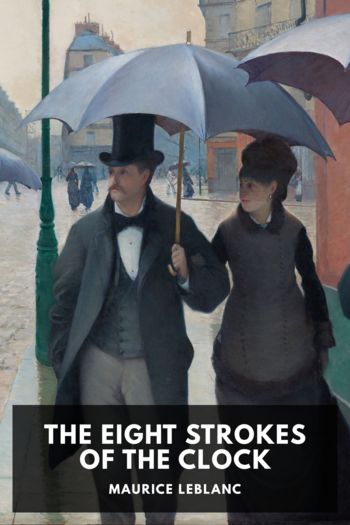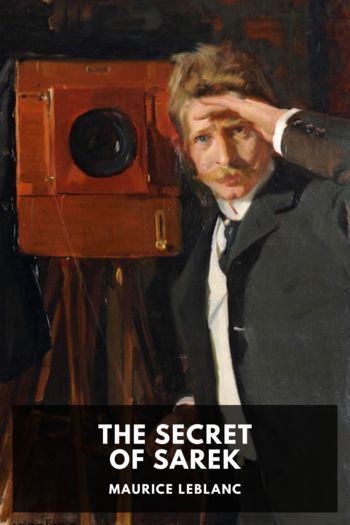The Eight Strokes of the Clock - Maurice Leblanc (reading in the dark .TXT) 📗

- Author: Maurice Leblanc
Book online «The Eight Strokes of the Clock - Maurice Leblanc (reading in the dark .TXT) 📗». Author Maurice Leblanc
They reached the esplanade in front of the Hauville chalets, with the capstans by which the fishermen haul up their boats to the beach. A number of inquisitive persons were standing outside the door of one of the chalets. Two coastguards, posted at the door, prevented them from entering.
The mayor shouldered his way eagerly through the crowd. He was back from the post-office, where he had been telephoning to Le Havre, to the office of the procurator-general, and had been told that the public prosecutor and an examining-magistrate would come on to Étretat in the course of the afternoon.
“That leaves us plenty of time for lunch,” said Rénine. “The tragedy will not be enacted before two or three o’clock. And I have an idea that it will be sensational.”
They hurried nevertheless. Hortense, overwrought by fatigue and her desire to know what was happening, continually questioned Rénine, who replied evasively, with his eyes turned to the esplanade, which they could see through the windows of the coffee-room.
“Are you watching for those two?” asked Hortense.
“Yes, the brother and sister.”
“Are you sure that they will venture? …”
“Look out! Here they come!”
He went out quickly.
Where the main street opened on the seafront, a lady and gentleman were advancing with hesitating steps, as though unfamiliar with the place. The brother was a puny little man, with a sallow complexion. He was wearing a motoring-cap. The sister too was short, but rather stout, and was wrapped in a large cloak. She struck them as a woman of a certain age, but still good-looking under the thin veil that covered her face.
They saw the groups of bystanders and drew nearer. Their gait betrayed uneasiness and hesitation.
The sister asked a question of a seaman. At the first words of his answer, which no doubt conveyed the news of d’Ormeval’s death, she uttered a cry and tried to force her way through the crowd. The brother, learning in his turn what had happened, made great play with his elbows and shouted to the coastguards:
“I’m a friend of d’Ormeval’s! … Here’s my card! Frédéric Astaing. … My sister, Germaine Astaing, knows Madame d’Ormeval intimately! … They were expecting us. … We had an appointment! …”
They were allowed to pass. Rénine, who had slipped behind them, followed them in without a word, accompanied by Hortense.
The d’Ormevals had four bedrooms and a sitting-room on the second floor. The sister rushed into one of the rooms and threw herself on her knees beside the bed on which the corpse lay stretched. Thérèse d’Ormeval was in the sitting-room and was sobbing in the midst of a small company of silent persons. The brother sat down beside her, eagerly seized her hands and said, in a trembling voice:
“My poor friend! … My poor friend! …”
Rénine and Hortense gazed at the pair of them: and Hortense whispered:
“And she’s supposed to have killed him for that? Impossible!”
“Nevertheless,” observed Rénine, “they are acquaintances; and we know that Astaing and his sister were also acquainted with a third person who was their accomplice. So that. …”
“It’s impossible!” Hortense repeated.
And, in spite of all presumption, she felt so much attracted by Thérèse that, when Frédéric Astaing stood up, she proceeded straightway to sit down beside her and consoled her in a gentle voice. The unhappy woman’s tears distressed her profoundly.
Rénine, on the other hand, applied himself from the outset to watching the brother and sister, as though this were the only thing that mattered, and did not take his eyes off Frédéric Astaing, who, with an air of indifference, began to make a minute inspection of the premises, examining the sitting-room, going into all the bedrooms, mingling with the various groups of persons present and asking questions about the manner in which the murder had been committed. Twice his sister came up and spoke to him. Then he went back to Madame d’Ormeval and again sat down beside her, full of earnest sympathy. Lastly, in the lobby, he had a long conversation with his sister, after which they parted, like people who have come to a perfect understanding. Frédéric then left. These manoeuvers had lasted quite thirty or forty minutes.
It was at this moment that the motorcar containing the examining-magistrate and the public prosecutor pulled up outside the chalets. Rénine, who did not expect them until later, said to Hortense:
“We must be quick. On no account leave Madame d’Ormeval.”
Word was sent up to the persons whose evidence might be of any service that they were to go to the beach, where the magistrate was beginning a preliminary investigation. He would call on Madame d’Ormeval afterwards. Accordingly, all who were present left the chalet. No one remained behind except the two guards and Germaine Astaing.
Germaine knelt down for the last time beside the dead man and, bending low, with her face in her hands, prayed for a long time. Then she rose and was opening the door on the landing, when Rénine came forward:
“I should like a few words with you, madame.”
She seemed surprised and replied:
“What is it, monsieur? I am listening.”
“Not here.”
“Where then, monsieur?”
“Next door, in the sitting-room.”
“No,” she said, sharply.
“Why not? Though you did not even shake hands with her, I presume that Madame d’Ormeval is your friend?”
He gave her no time to reflect, drew her into the next room, closed the door and, at once pouncing upon Madame d’Ormeval, who was trying to go out and return to her own room, said:
“No, madame, listen, I implore you. Madame Astaing’s presence need not drive you away. We have very serious matters to discuss, without losing a minute.”
The two women, standing face to face, were looking at each other with the same expression of implacable hatred, in which might be read the same confusion of spirit and





Comments (0)